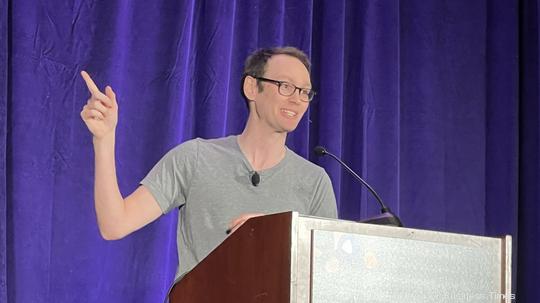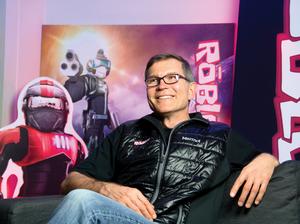
Josh Wardle isn’t a household name, but the game he made is.
Wordle is a simple web game that has users trying to guess a five-letter word in English in six tries or less.
The game became such a hit that the New York Times bought it in January for an undisclosed sum “in the low seven figures,” the NYT said. Wardle had been approached by investors but declined to take venture capital funding, as TechCrunch has reported.
So why did he sell a game that can be confidently described as a viral phenomenon? Wardle told a rapt audience during the Game Developer’s Conference in San Francisco that he considers himself an artist as well as a software engineer and had no interest maximizing the game's commercial potential. After all, he started Wordle as a passion project to entertain his partner at the time. The game’s success was also creating more stress than he cared to deal with, he told the conference, which is being held in-person at Moscone Center this week.
During a session titled “'Wordle': Doing the Opposite of What You're Meant To,” Wardle outlined seven things that he did while building Wordle which run contrary to game development best practices. The game’s success was unintentional, and that might be part of its magic.
Here are the seven development mistakes that led to Wordle’s success, according to Wardle:
1. It was a word game.
“When you think about viral, exciting games, you don’t think about word games. Which is kind of sad to me. I love words, I love language.”
2. Game play is limited.
“You can only play once a day. Each day there’s a new puzzle. It’s something that you’re not meant to do, especially in mobile games. I think there’s this expectation that you just give the person what they want, which is to play endlessly. … I don’t really like that. I just wanted a game that’s just three minutes of your time a day and that’s it.”
3. No app, just a website.
“A byproduct of this decision, actually, I think… is that Wordle is really shareable. You can just give someone the link and they could play. And that especially became important if you’re sending it to someone, a relative, who isn’t as literate tech-wise. You knew that they could just click on the link and play.”
4. It had a terrible URL.
“It was utterly absurd. I think looking back on it now, probably a vanity URL maybe would’ve been a bit better. But I think it was one of those things that I assumed you needed but I think the success of Wordle kind of proves to me that it wasn’t the end all, be all.”
5. The share button doesn’t generate a link.
“I did it originally with the link. There were a bunch of things going on. One is the grid has this really beautiful, simple aesthetic and if you throw out the link there it kinda looks kinda crappy, in my opinion. The other one is that I felt really uncomfortable there. If a game has an agenda to get you to share, because it means that more people will come play the game, like why am I encouraging people to share? Am I encouraging them because they want to do it, or am I encouraging it because it’s good for the game? So just removing the URL felt like that would be way simpler.”
6. There was no business proposition.
“I had no interest in running a games business, basically. I think of myself as an artist. I really enjoy creating things. Running a gaming business is not interesting to me at all… For some people it would be different but for me this was clear.”
7. Monetization was out of the question.
“Selling it to the NYT, I monetized the game. But in the lead up to that, I hadn’t done that. And that was just, I was making a game with my partner and I wasn’t going to put ads on it. And even when it become really popular… I thought, why can’t it just be a nice thing on the internet that people can play? And I didn’t want to do anything with tracking people or selling data.”








